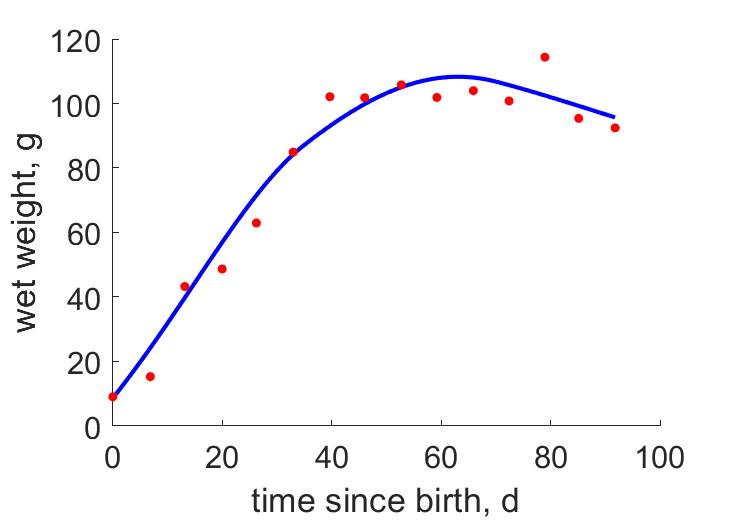Predictions & Data for this entry
| Model: std | climate: MB | migrate: Ml | phylum: |
| COMPLETE = 2.5 | ecozone: MP | food: biCvf, biCik, biCic | class: |
| MRE = 0.032 | habitat: 0iMc | gender: Dg | order: |
| SMSE = 0.002 | embryo: Tntfm | reprod: O | family: |
Zero-variate data
| Data | Observed | Predicted | (RE) | Unit | Description | Reference |
|---|---|---|---|---|---|---|
| ab | 45 | 46.39 | (0.03084) | d | age at birth | MarkLeas1992 |
| tx | 89.2 | 90.93 | (0.01938) | d | time since birth at fledging | MarkLeas1992 |
| tp | 267.6 | 249.8 | (0.0664) | d | time since birth at puberty | guess |
| tR | 1825 | 1825 | ( 0) | d | time since birth at 1st brood | AnAge |
| am | 1.095e+04 | 1.1e+04 | (0.004894) | d | life span | AnAge |
| Wwb | 9 | 8.598 | (0.04467) | g | wet weight at birth | MarkLeas1992 |
| Wwi | 130 | 128.7 | (0.009862) | g | ultimate wet weight | MarkLeas1992 |
| Ri | 0.00274 | 0.002687 | (0.0194) | #/d | maximum reprod rate | MarkLeas1992 |
Uni- and bivariate data
| Data | Figure | Independent variable | Dependent variable | (RE) | Reference |
|---|---|---|---|---|---|
| tW |  | time since birth | wet weight | (0.06427) | MarkLeas1992 |
Pseudo-data at Tref = 20°C
| Data | Generalised animal | Oceanodroma tristrami | Unit | Description |
|---|---|---|---|---|
| v | 0.02 | 0.01475 | cm/d | energy conductance |
| p_M | 18 | 278.4 | J/d.cm^3 | vol-spec som maint |
| k_J | 0.002 | 0.01187 | 1/d | maturity maint rate coefficient |
| k | 0.3 | 0.3109 | - | maintenance ratio |
| kap | 0.8 | 0.9302 | - | allocation fraction to soma |
| kap_G | 0.8 | 0.8038 | - | growth efficiency |
| kap_R | 0.95 | 0.95 | - | reproduction efficiency |
Discussion
- Feeding is reduced towards end of nestling period
- mod_1: Pseudo-data point k is used, rather than k_J; Data set tp and parameter t_R are added, the latter replacing clutch interval t_N. Postnatal T is based on PrinPres1991, see get_T_Aves. See further the revision page, theme puberty
Bibliography